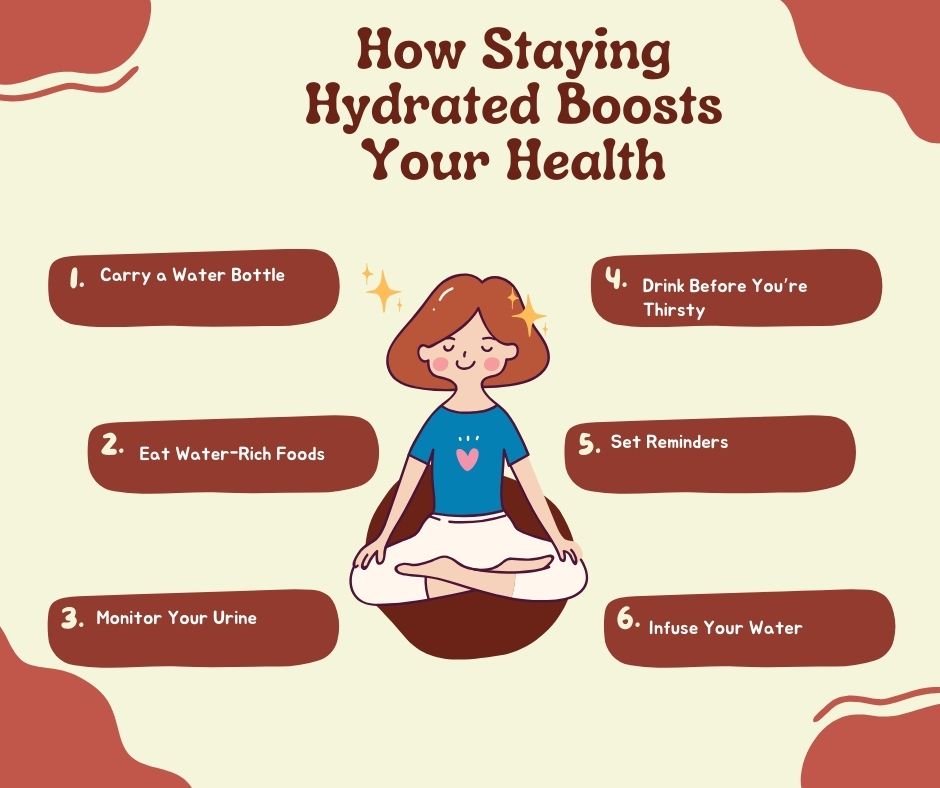How to Staying Hydrated Boosts Your Health

Water is essential for life, yet many people underestimate the importance of staying hydrated. Proper hydration plays a critical role in maintaining overall health, from supporting bodily functions to improving energy levels and mental clarity. In this article, we’ll explore the benefits of hydration, signs of dehydration, and tips to ensure you’re drinking enough water every day.
Why Hydration Matters
Supports Bodily Functions
Water is involved in nearly every bodily function, including digestion, circulation, and temperature regulation.
Boosts Energy Levels
Dehydration can lead to fatigue and reduced physical performance. Staying hydrated helps maintain energy levels throughout the day.
Improves Skin Health
Proper hydration keeps your skin moisturized, reducing the appearance of wrinkles and promoting a healthy glow.
Aids in Weight Management
Drinking water before meals can help control appetite and prevent overeating.
Enhances Mental Clarity
Even mild dehydration can impair focus, memory, and mood. Staying hydrated supports optimal brain function.
Promotes Kidney Health
Water helps flush out toxins and waste products, reducing the risk of kidney stones and urinary tract infections.
Signs of Dehydration
Dry mouth and throat
Dark yellow urine
Fatigue or dizziness
Headaches
Dry skin
Reduced urine output
Tips to Stay Hydrated
Carry a Water Bottle
Keep a reusable water bottle with you to make it easy to drink water throughout the day.
Set Reminders
Use apps or alarms to remind yourself to drink water regularly.
Infuse Your Water
Add fruits like lemon, cucumber, or berries to your water for a refreshing twist.
Eat Water-Rich Foods
Include foods like watermelon, cucumbers, oranges, and lettuce in your diet to boost hydration.
Monitor Your Urine
Aim for light yellow urine as a sign of proper hydration.
Drink Before You’re Thirsty
Thirst is a late sign of dehydration. Drink water consistently throughout the day.
Conclusion
Staying hydrated is one of the simplest yet most effective ways to support your overall health. By making hydration a priority, you can improve your energy levels, mental clarity, and physical well-being. Start today by incorporating these tips into your daily routine and experience the benefits of proper hydration.
Frequently Asked Questions (FAQs)
- How much water should I drink daily?
The general recommendation is 8 cups (64 ounces) per day, but individual needs vary based on factors like activity level and climate.
- Can I drink too much water?
Yes, overhydration (hyponatremia) can be dangerous. Listen to your body and avoid excessive water intake.
- Does coffee or tea count toward hydration?
Yes, moderate amounts of coffee and tea can contribute to your daily fluid intake, but water is still the best choice.
- What are the best times to drink water?
Drink water when you wake up, before meals, during exercise, and whenever you feel thirsty.
- Can dehydration affect my mood?
Yes, dehydration can lead to irritability, anxiety, and difficulty concentrating.
- Are sports drinks better than water for hydration?
Sports drinks are only necessary during intense exercise lasting more than an hour. For most people, water is sufficient.
Note: This content is for informational purposes only and does not constitute medical advice. Always consult with a healthcare professional 1 for any health concerns or before making any significant changes to your lifestyle
Related Posts

Top 5 Health Trends in the USA for 2025

Men’s Mental Health Month: Breaking the Stigma and Prioritizing Well Being

The Benefits of Yoga for Mind and Body: A Beginner’s Guide
About Author
sanjupaudel
I am Sanju Paudel, a dedicated healthcare professional, registered nurse, and passionate writer based in the United States. With a strong foundation in nursing and a commitment to promoting health and wellness, I specialize in creating insightful and evidence-based content on healthcare, yoga, medication, and education. My journey in healthcare began with a deep desire to make a positive impact on people’s lives. As a registered nurse, I have gained extensive experience in patient care, health education, and clinical practice. My expertise spans various aspects of healthcare, including preventive care, chronic disease management, and holistic wellness practices such as yoga and mindfulness. In addition to my clinical work, I am an accomplished writer who combines my medical knowledge with a talent for clear, engaging communication. I write articles, guides, and educational content to empower individuals to take control of their health and well-being. My writing focuses on topics such as healthcare trends, medication safety, the benefits of yoga, and the importance of lifelong learning in the medical field. My mission is to bridge the gap between healthcare professionals and the general public by providing accurate, accessible, and actionable information. Whether through my nursing practice or my writing, I am committed to fostering healthier communities and inspiring others to prioritize their physical, mental, and emotional well-being. When I’m not working, I enjoy practicing yoga, exploring the latest advancements in healthcare, and spending time with family and friends. I believe in the power of education and self-care as essential tools for achieving a balanced and fulfilling life